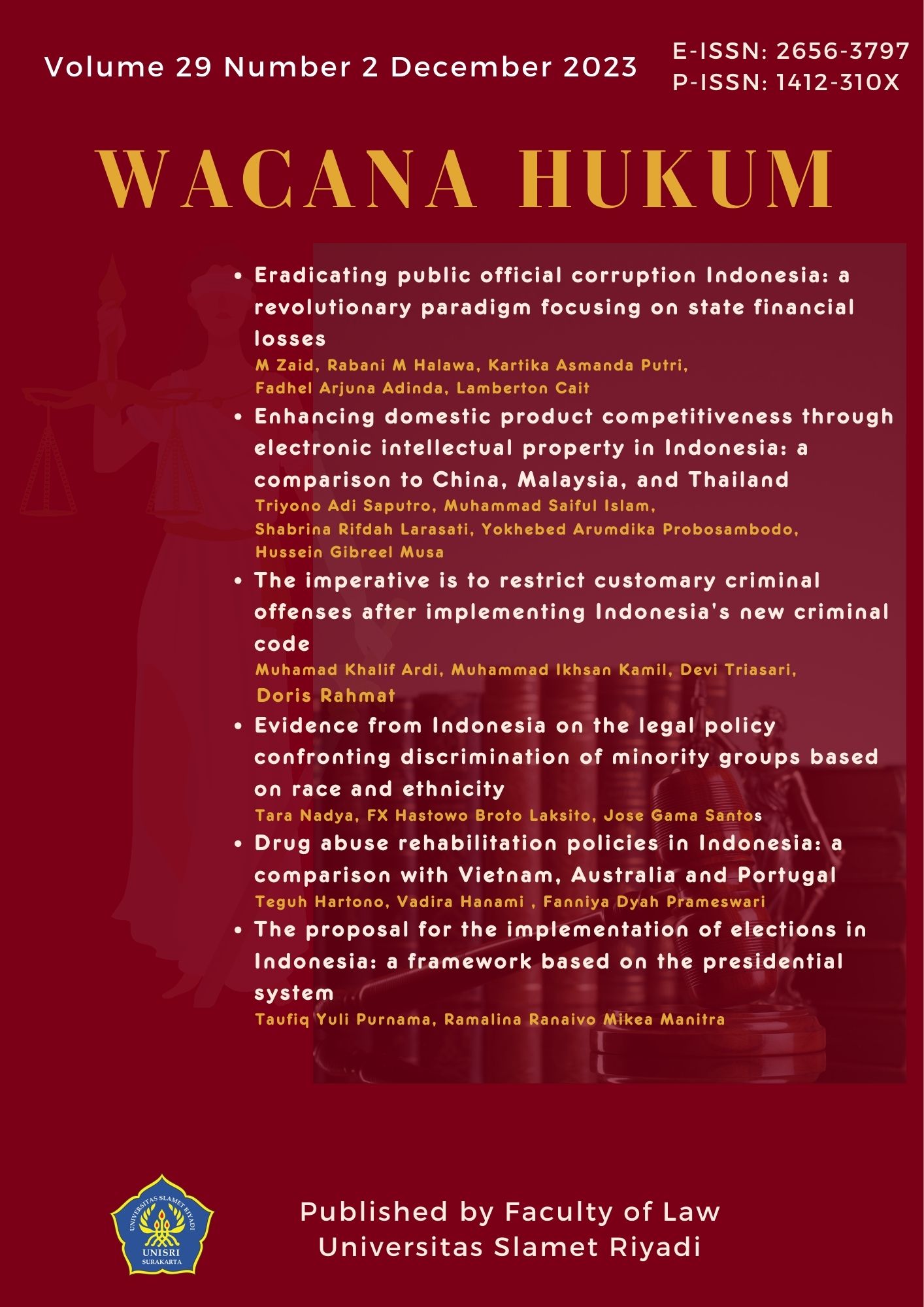Drug abuse rehabilitation policies in Indonesia: a comparison with Vietnam, Australia and Portugal
DOI:
https://doi.org/10.33061/wh.v29i2.9576Keywords:
Judge judgment; Narcotics addict or drug abuser; Philosophical orientation;Abstract
This article wants to analyze the judge's verdict orientation of the rehabilitation case for addicts or drug abusers. Far from the construction of rehabilitation laws in Indonesia, there is a diffusion of norms between the health and the criminal approach. Legal research with a constitutional and case approach at the state court in Bali and Yogyakarta. A comparative approach of law with other countries. The study suggests that judges are more likely to drop sentences in prison sentences than in rehabilitation, even though the accused meets the criteria of narcotics law and a writ of avoidance of the Supreme Court. The complaint was merely a recommendation that judges were not required to comply with, as was the case in Portugal and Australia. The judge's paradigm of self-initiated drug abuse, like narcotics crimes, is similar in Vietnam. Whereas the philosophical orientation of the judges in deciding the issue of rehabilitation should be based on principles of humanity and justice as governed by the just and civilized precepts of humanity and the precepts of social justice for all peoples of Indonesia. The judge is required to consider the report on the results of the conviction of both criminal and criminal action to the perpetrator of criminal narcotics. Also, future prescriptions for self-initiated drug abuse recovery should be changed with a health approach, drawing a firm line of distinguishing from narcotics crimes. Process in court with a fast trial, including an arrangement for arrest, was held in a designated rehabilitation facility or hospital.
References
Ali, Mahrus, ‘Pemetaan Tesis Dalam Aliran-Aliran Filsafat Hukum Dan Konsekuensi Metodologisnya’, Jurnal Hukum IUS QUIA IUSTUM, 24.2 (2017), 213–31 <https://doi.org/10.20885/iustum.vol24.iss2.art3>
Ardill, Allan, ‘Mandatory Welfare Drug Treatment in Australia’, Journal of Law and Medicine, 26.4 (2019), 800–814
Atif, Muhammad, Shane Scahill, Muhammad Azeem, Muhammad Rehan Sarwar, and Zaheer-Ud-Din Babar, ‘Drug Utilization Patterns in the Global Context: A Systematic Review’, Health Policy and Technology, 6.4 (2017), 457–70 <https://doi.org/https://doi.org/10.1016/j.hlpt.2017.11.001>
Atmaja, Gede Marhaendra Wija, Ilmu Perundang-Undangan, Pertama (Klungkung: Sekretariat Daerah Kabupaten Klungkung, 2016)
Bellew, Cruesteen, ‘Aequitas Sequitur Legem’, Oxford Site, 2010, pp. 1–3
Diala, Anthony C., ‘The Concept of Living Customary Law: A Critique’, Journal of Legal Pluralism and Unofficial Law, 49.2 (2017), 143–65 <https://doi.org/10.1080/07329113.2017.1331301>
ELVIANDRI, E., ‘Quo Vadis Negara Kesejahteraan: Meneguhkan Ideologi Welfare State Negara Hukum Kesejahteraan Indonesia’, Mimbar Hukum - Fakultas Hukum Universitas Gadjah Mada, 31.2 (2019), 252 <https://doi.org/10.22146/jmh.32986>
Firdaus, Insan, ‘Harmonisasi Undang-Undang Narkotika Dengan Undang-Undang Pemasyarakatan Terkait Rehabilitasi Narkotika Bagi Warga Binaan Pemasyarakatan’, Jurnal Penelitian Hukum De Jure, 21.1 (2021), 141 <https://doi.org/10.30641/dejure.2021.V21.141-160>
Florentin, S., Y. Neumark, S. Raskin, T. Bdolah-Abram, and P. Rosca, ‘Differential Effect of Community Rehabilitation Reform on Hospitalizations of Patients with Chronic Psychotic Disorders With and Without Substance Use Disorder, Israel, 1991–2016’, Administration and Policy in Mental Health and Mental Health Services Research, 48.2 (2021), 354–62 <https://doi.org/10.1007/s10488-020-01077-4>
Friedrich, Carl Joachim, The Philosophy of Law in Historical Perspective, Rev (Chicago: University of Chicago, 1963)
Gunarto, Marcus Priyo, ‘Restrukturisasi Peradilan Pidana Sebagai Upaya Mencegah Kelebihan Kapasitas Narapidana Di Lembaga Pemasyarakatan’, in Pidato Pengukuhan Jabatan Guru Besar Pada Fakultas Hukum Universitas Gadjah Mada (Yogyakarta: UGM Press, 2013), pp. 1–25
Hasselgård-Rowe, Jennifer, ‘Detaining People Who Use Drugs in Cambodia: A Dual-Track System’, International Journal of Drug Policy, 93 (2021), 102911 <https://doi.org/https://doi.org/10.1016/j.drugpo.2020.102911>
Hieu, Dang Minh, Benjamin Gray, Dang Minh Tuan, and Benjamin P Colman, ‘Facing Drug Addiction: Vietnam’s Struggle with Opioids’, Drug Science, Policy and Law, 7 (2021), 205032452110349 <https://doi.org/10.1177/20503245211034934>
Igir, Wulan E., Olga A. Pangkerego, and Anna S. Wahongan, ‘Pembinaan Terhadap Anak Pelaku Tindak Pidana Narkotika Dalam Rangka Perlindungan Anak’, Lex Crimen, 9.3 (2020), 104–14
Kerrison, Erin M., ‘Exploring How Prison-Based Drug Rehabilitation Programming Shapes Racial Disparities in Substance Use Disorder Recovery’, Social Science & Medicine, 199 (2018), 140–47 <https://doi.org/10.1016/j.socscimed.2017.08.002>
Lasco, Gideon, ‘Drugs and Drug Wars as Populist Tropes in Asia: Illustrative Examples and Implications for Drug Policy’, International Journal of Drug Policy, 77 (2020), 102668 <https://doi.org/https://doi.org/10.1016/j.drugpo.2020.102668>
———, ‘Kalaban: Young Drug Users’ Engagements with Law Enforcement in the Philippines’, International Journal of Drug Policy, 52 (2018), 39–44 <https://doi.org/https://doi.org/10.1016/j.drugpo.2017.11.006>
Loh, Debbie Ann, Emma Plugge, and Marie-Claire Van Hout, ‘Continuity of Opioid Substitution Treatment between Prison and Community in Southeast Asia: A Scoping Review’, International Journal of Drug Policy, 112 (2023), 103957 <https://doi.org/https://doi.org/10.1016/j.drugpo.2023.103957>
Luong, Hai Thanh, ‘Reprint of: Why Vietnam Continues to Impose the Death Penalty for Drug Offences: A Narrative Commentary’, International Journal of Drug Policy, 92 (2021), 103132 <https://doi.org/https://doi.org/10.1016/j.drugpo.2021.103132>
———, ‘Why Vietnam Continues to Impose the Death Penalty for Drug Offences: A Narrative Commentary’, International Journal of Drug Policy, 88 (2021), 103043 <https://doi.org/https://doi.org/10.1016/j.drugpo.2020.103043>
Manullang, E. Fernando M., ‘Misinterpretasi Ide Gustav Radbruch Mengenai Doktrin Filosofis Tentang Validitas Dalam Pembentukan Undang-Undang’, Undang: Jurnal Hukum, 5.2 (2022), 453–80 <https://doi.org/10.22437/ujh.5.2.453-480>
Nadie, Ambarawa, ‘KALEIDOSKOP 2019: Deretan Artis Yang Terjerat Narkoba’, Kompas.Com, 2019, pp. 1–3
Organization, World Health, ‘“WHO’s Role, Mandate and Activities to Counter the World Drug Problem: A Public Health Perspectiveâ€â€™, World Health Organization, 2010, pp. 1–3
Saputra, Rian, Muhammad Khalif Ardi, Pujiyono Pujiyono, and Sunny Ummul Firdaus, ‘Reform Regulation of Novum in Criminal Judges in an Effort to Provide Legal Certainty’, JILS (Journal of Indonesian Legal Studies), 6.2 (2021), 437–82 <https://doi.org/10.15294/jils.v6i2.51371>
Saputra, Rian, Josef Purwadi Setiodjati, and Jaco Barkhuizen, ‘Under-Legislation in Electronic Trials and Renewing Criminal Law Enforcement in Indonesia (Comparison with United States)’, JOURNAL of INDONESIAN LEGAL STUDIES, 8.1 (2023), 243–88 <https://doi.org/10.15294/jils.v8i1.67632>
Saputra, Rian, M Zaid, and Silaas Oghenemaro, ‘The Court Online Content Moderation : A Constitutional Framework’, Journal of Human Rights, Culture and Legal System, 2.3 (2022), 139–48 <https://doi.org/10.53955/jhcls.v2i3.54>
Saputra, Rian, M Zaid, Pujiyono Suwadi, Jaco Barkhuizen, and Tiara Tiolince, ‘Reconstruction of Chemical Castration Sanctions Implementation Based on the Medical Ethics Code (Comparison with Russia and South Korea)’, Lex Scientia Law Review, 7.1 (2023), 61–118 <https://doi.org/10.15294/lesrev.v7i1.64143>
Sara, Safyanu Shuaibu, Muazu Abba, Jabir, and Mora Halima Inuwa, ‘Understanding Drug Abuse among Adolescents Youth: Prevention and Counselling Rehabilitation Strategies’, Journal of Educational Policy and Entrepreneurial Research, 4.6 (2017), 110–32
Setianingsih, Yeni, ‘Induktivisme-Empirisisme Francis Bacon Dan Relevansinya Bagi Ilmu-Ilmu Keagamaan’, Indonesian Journal of Islamic Theology and Philosophy, 1.2 (2020), 63–84 <https://doi.org/10.24042/ijitp.v1i2.4930>
Situmorang, Donny Michael, ‘Implementasi Undang-Undang Narkotika Ditinjau Dari Perspektif Hak Asasi Manusia’, Jurnal Penelitian Hukum De Jure, 18.3 (2018), 415 <https://doi.org/10.30641/dejure.2018.V18.415-432>
Soemarsono, Maleha, ‘NEGARA HUKUM INDONESIA DITINJAU DARI SUDUT TEORI TUJUAN NEGARA’, Jurnal Hukum & Pembangunan, 37.2 (2017), 300 <https://doi.org/10.21143/jhp.vol37.no2.1480>
Strang, John, Thomas Babor, Jonathan Caulkins, Benedikt Fischer, David Foxcroft, and Keith Humphreys, ‘Drug Policy and the Public Good: Evidence for Effective Interventions’, The Lancet, 379.9810 (2012), 71–83 <https://doi.org/https://doi.org/10.1016/S0140-6736(11)61674-7>
Subekti, Slamet, ‘FILSAFAT ILMU KARL R. POPPER DAN THOMAS S. KUHN SERTA IMPLIKASINYA DALAM PENGAJARAN ILMU’, HUMANIKA, 22.2 (2015), 39 <https://doi.org/10.14710/humanika.22.2.39-46>
Thoib, Ismail, Wacana Baru Pendidikan Meretas Filsafat Pendidikan, Pertama (Yogyakarta: Genta Press, 2008)
Tran, Mai Thi Ngoc, Michael P. Dunne, Giang Minh Le, Hoe Dinh Han, Trang Thu Nguyen, Hai Thanh Luong, and others, ‘Understanding Vietnam’s Drug Policy for Amphetamine-Type Stimulants Misuse’, Harm Reduction Journal, 19.1 (2022), 45 <https://doi.org/10.1186/s12954-022-00621-9>
Utami, Diah Setia, ‘Perspektif BNN Atas Aturan Dan Implementasi Rehabilitasi Dan Perbandingan Negara Lain’, in Seminar Nasional “Efektivitas Rehabilitasi Sebagai Pemidanaan Terhadap Penyalah Guna Narkotikaâ€, Kerjasama Kamar Pidana MA RI –Balitbangdiklat Kumdil MA RI, 2019, pp. 30–41
Welfare, Australian Institute of Health and, ‘Drug and Alcohol Rehabilitation’, Australian Institute of Health and Welfare, 2022, pp. 1–6
Werb, D., A. Kamarulzaman, M.C. Meacham, C. Rafful, B. Fischer, S.A. Strathdee, and others, ‘The Effectiveness of Compulsory Drug Treatment: A Systematic Review’, International Journal of Drug Policy, 28 (2016), 1–9 <https://doi.org/10.1016/j.drugpo.2015.12.005>
Wibowo, Priambodo Adi, and Sinarianda Kurnia H, ‘Rehabilitation For Addicts For Victims To Spike Narcotics In The Penal System’, Jurnal Wacana Hukum Dan Sains, 3.35 (2012), 18–42
Widjaja, Widjaja, Penerapan Nilai-Nilai Pancasila Dan HAM Di Indonesia, Revisi (Jakarta: Rineka Cipta, 2000)
Wolfe, D, N Luhmann, M Harris, A Momenghalibaf, E Albers, J Byrne, and others, ‘Human Rights and Access to Hepatitis C Treatment for People Who Inject Drugs’, International Journal of Drug Policy, 26.11 (2015), 1072–80 <https://doi.org/https://doi.org/10.1016/j.drugpo.2015.05.007>
Wolfe, Daniel, and Roxanne Saucier, ‘In Rehabilitation’s Name? Ending Institutionalised Cruelty and Degrading Treatment of People Who Use Drugs’, International Journal of Drug Policy, 21.3 (2010), 145–48 <https://doi.org/https://doi.org/10.1016/j.drugpo.2010.01.008>
Yusay, Camille Therese C, and Nico A Canoy, ‘Healing the Hurt amid the Drug War: Narratives of Young Urban Poor Filipinos in Recovering Families with Parental Drug Use’, International Journal of Drug Policy, 68 (2019), 124–31 <https://doi.org/https://doi.org/10.1016/j.drugpo.2018.10.009>
Downloads
Published
How to Cite
Issue
Section
License
Copyright (c) 2023 Teguh Hartono, Vadira Hanami , Fanniya Dyah Prameswari

This work is licensed under a Creative Commons Attribution-ShareAlike 4.0 International License.
Authors who publish with this journal agree to the following terms:
- Copyright on any article is retained by the author(s).
- The author grants the journal, the right of first publication with the work simultaneously licensed under a Creative Commons Attribution License that allows others to share the work with an acknowledgment of the work’s authorship and initial publication in this journal.
- Authors are able to enter into separate, additional contractual arrangements for the non-exclusive distribution of the journal’s published version of the work (e.g., post it to an institutional repository or publish it in a book), with an acknowledgment of its initial publication in this journal.
- Authors are permitted and encouraged to post their work online (e.g., in institutional repositories or on their website) prior to and during the submission process, as it can lead to productive exchanges, as well as earlier and greater citation of published work.
- The article and any associated published material is distributed under the Creative Commons Attribution-ShareAlike 4.0 International License

















.png)


